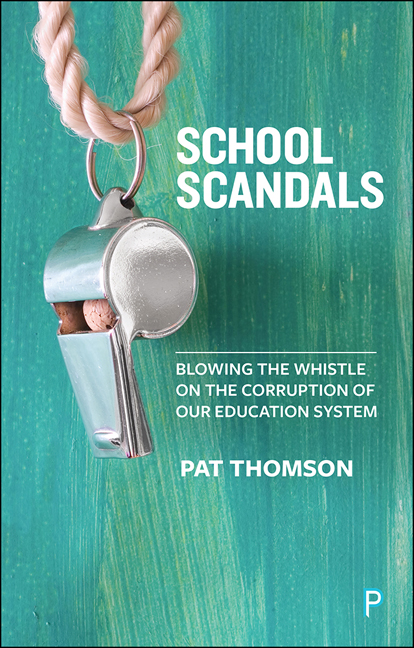Book contents
- Frontmatter
- Dedication
- Contents
- List of Tables and Boxes
- Glossary
- Acknowledgements
- Preface
- 1 A Book about Corruption in Schools
- 2 A Scandalous Schooling Muddle
- 3 Reforming Public Infrastructure
- 4 Costly Measures
- 5 Market Mentalities and Malpractices
- 6 The Effects of Effectiveness
- 7 Secrecy, lies and Gaming
- 8 Rebuilding Organisational Infrastructure
- 9 A Public Good Agenda for Change
- Notes
- Bibliography
- Index
1 - A Book about Corruption in Schools
Published online by Cambridge University Press: 25 February 2021
- Frontmatter
- Dedication
- Contents
- List of Tables and Boxes
- Glossary
- Acknowledgements
- Preface
- 1 A Book about Corruption in Schools
- 2 A Scandalous Schooling Muddle
- 3 Reforming Public Infrastructure
- 4 Costly Measures
- 5 Market Mentalities and Malpractices
- 6 The Effects of Effectiveness
- 7 Secrecy, lies and Gaming
- 8 Rebuilding Organisational Infrastructure
- 9 A Public Good Agenda for Change
- Notes
- Bibliography
- Index
Summary
Children falling off the grid in the tens of thousands amid surge in pupils leaving mainstream education
The Independent, 5 February 2019Disgraced superhead cannot appeal over £1.4 million in unlawful bonuses
Times Educational Supplement, 18 February 2019Banned; Head who gave contract to his mother's firm
Times Educational Supplement, 8 March 2019Trusts fail to make use of £500k DfE takeover funding
Schools Week, 19 March 2016Academy boss ‘ordered schools to cheat on SATS test’
BBC Panorama, 25 March 2019These are a handful of the 2019 headlines about schooling from English media. Three are very clearly about what is generally understood as corruption: nepotism and cheating. The other two – early school leaving and waste – are not obviously so. The connection between explicit corruption and other ‘bad behaviour’ in the school system is at the heart of this book.
Why this book?
There are many contradictory media stories about schooling in England. We hear about lack of funds and of funds unused, misspent and misappropriated. We read of test results good, bad and fraudulent. And we read of outstanding schools, failing schools and schools that fail too many children. How are we to make sense of these stories? What kind of school system produces such a bewildering array of reports? How are we to judge what is true? What is causing the problems we read about? And if we are concerned about the state of schooling, what can be done? This book goes behind the headlines and the individual stories to piece together a more coherent narrative.
I started to notice headlines about corrupt practices in schooling some years ago. Then I started to collect them. I have been systematically compiling and filing media reports about what I initially called ‘bad behaviour’ for the last six years. Those listed at the start of the chapter are representative of the collection. They are not isolated examples. When I first read over my collection of some 3,800 items, it became clear that there were patterns to the events reported. There was something both structural and cultural going on. I wondered whether examining the patterns would shed light on what is, and isn’t, happening in education.
- Type
- Chapter
- Information
- School ScandalsBlowing the Whistle on the Corruption of Our Education System, pp. 1 - 18Publisher: Bristol University PressPrint publication year: 2020



